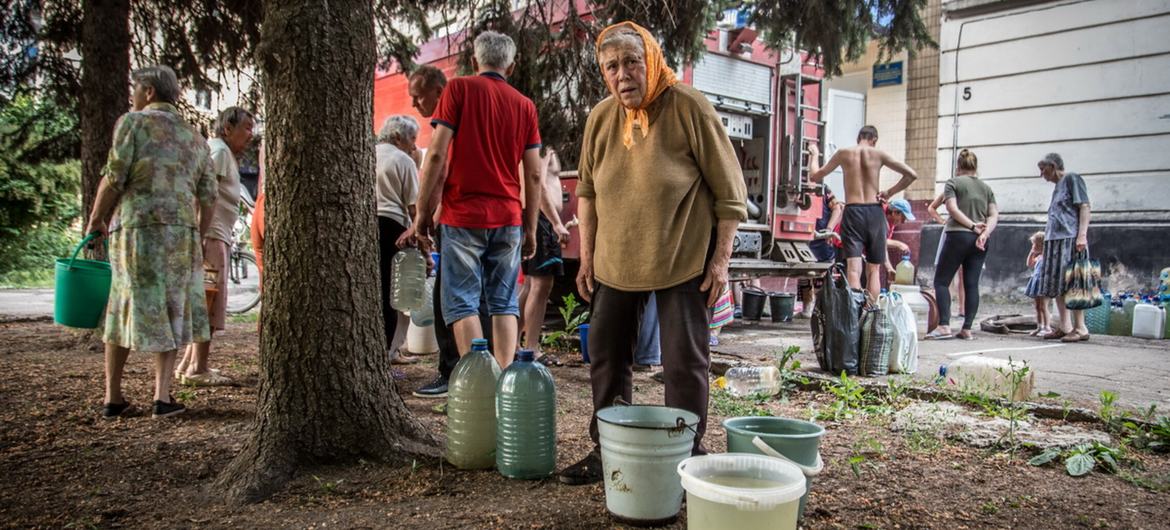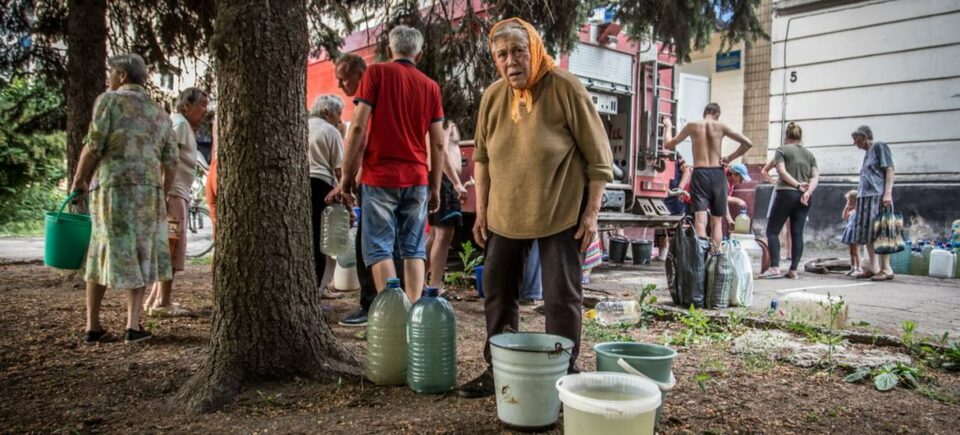The torment being unleashed by Russia’s “senseless war”, on the people of Ukraine and beyond, is “colossal”, the UN Emergency Relief Coordinator told the Security Council on Tuesday.
Amidst ongoing humanitarian operations, Martin Griffiths told ambassadors he had come to brief them in New York on “the widespread death, destruction, displacement, and suffering” taking place since the invasion of 24 February, and the challenges that the continuing violence and winter weather were exacerbating.
“Over 14 million people remain forcibly displaced from their homes in Ukraine, including 6.5 million internally displaced in Ukraine, and over 7.8 million refugees recorded across Europe”, he detailed.
Health under fire
Our work to help people in #Kherson continues. Last week, @un & partners delivered an additional 10 trucks of supplies to 2 communities on the outskirts of the city:
🔹health kits to treat 20k patients for 3 months
🔹hygiene kits for 6k people
🔹winter supplies for 1,5k families https://t.co/SVvtdlhBS1
OCHA_Ukraine
Citing the UN human rights office OHCHR, he said that 17,023 civilians have been killed since 24 February, including 419 children, but “we know that the real toll is far greater”.
The World Health Organization (WHO) estimates there have been at least 715 attacks on Ukraine’s health system, including 630 that impacted health facilities and 61 affecting personnel.
“These attacks in Ukraine represent more than 70 per cent of all attacks on healthcare infrastructure reported worldwide this year”, said the UN relief chief.
Mr. Griffiths said that since 24 February, 1,148 children had been killed or injured, “while millions have fled, been uprooted from their homes, separated from their families or put at risk of violence”.
Child suffering
He became visibly choked up in the chamber, relaying that some 765,000 children have needed and received psycho-social support, to help them deal with the trauma they have gone through.
Meanwhile, mobile teams in centres for the internally displaced, are registering, assessing and providing direct support.
At the same time, gender-based violence targeting women and girls continues to be pervasive, and under-reported, he said.
As humanitarians work to respond, they are scaling up essential services, including a network of safe spaces, and delivering survivor-centered services for women, girls, boys and men, who have experienced gender-based violence.
Assault on energy grid
Amidst freezing temperatures that are expected to drop to below -20°C, attacks on the country’s energy infrastructure continue, leaving millions without access to heat, electricity, and water – “adding another dangerous dimension to the humanitarian crisis caused by the war”, said Mr. Griffiths.
These attacks deprive people of basic healthcare and children of their right to an education.
“In Ukraine today, the ability of civilians to survive is under attack”, he spelled out, reminding that the already vulnerable, such as the elderly and displaced, are at the highest risk.
Under international law, “objects indispensable to survival…must be protected…throughout all military operations”, Mr. Griffiths added.
The humanitarian community continues to stay and deliver for Ukrainians, with almost 690 partners providing life-critical aid and protection services to 13.5 million people.
Plea for international support
Working around the clock to provide vital services and supplies for the winter, they have already reached more than 630,000 civilians, providing around 400 lifesaving generators to essential facilities.
However, since October, sustained attacks on the whole energy grid by Russian forces, have created a whole new level of need, he warned.
“The scale of destruction of the electrical and heating infrastructure requires the international community’s enhanced support to the Government of Ukraine beyond what humanitarians can provide”, he warned.

Donor generosity
Mr. Griffiths lauded unprecedented support from national governments and others, for the UN’s Ukraine Flash Appeal, noting receipt of $3.1 billion of the $4.3 required through the end of the year.
“To date, we have transferred almost $1 billion in humanitarian cash assistance to more than 4.3 million people”, he said.
“But more must be done to close the funding shortfall. Continued support is critical to sustain humanitarian operations through 2023”.
Accessing those in need
While acknowledging some improvements in humanitarian access, he said impediments to reaching areas in Donetsk, Luhansk, Kherson and Zaporizhzhia remain.
“It is absolutely vital that humanitarians be allowed to send personnel and inter-agency convoys to deliver relief items to all those in need, wherever they are located”, he underscored.
Of the 13.5 million people reached since February, around a million are in areas outside the Ukraine Government’s control.
“Under international humanitarian law, all parties must allow and facilitate the rapid and unimpeded passage of humanitarian relief for civilians in need and must ensure that relief personnel have the freedom of movement required for their work”, he said.
‘Spare no effort’
At the beginning of 2022, 274 million people needed humanitarian assistance. The projected number for 2023 has now grown to 339 million – a 24 per cent increase, Mr. Griffiths told ambassadors.
“It represents one in every 23 people on the planet”, he said, equating the number to a population the size of the world’s most populous country.
“We must do more to reverse this devastating trend and…redouble all efforts to prevent further escalation and end the war in Ukraine…and spare no effort for peace”.
Click here to watch the meeting in its entirety.
As an independent media platform, we do not take advertisements from governments and corporate houses. It is you, our readers, who have supported us on our journey to do honest and unbiased journalism. Please contribute, so that we can continue to do the same in future.

